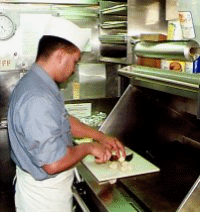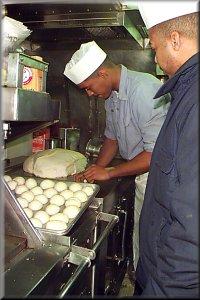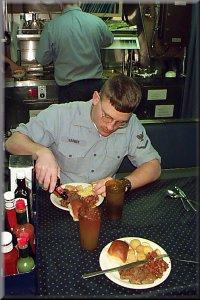
Mess Management Specialists Cook Up Innovative OJT
By Bill Kenny, Public Affairs Officer, Naval Submarine School
| USS
Pittsburgh (SSN 720) is silent and stealthy
but unbelievably cramped. You’ve got sailors
sleeping on top of one another on shelves, er,
bunks, eating in shifts or turning sideways to
walk past one another in passageways. As cramped
as a submarine seems, close quarters is an art
form when you enter the galley. Totally functional -- totally stainless steel. And crowded. Really crowded with about ten sailors, where three might be, in constant motion, squeezing past one another into the walk-in freezer, near the shelf where the chocolate cream pies are setting, towards the grill, where part of the fifty five pounds of tenderloin is grilling, brushing the oven with the sweet rolls rising and past the stove where the Franconia potatoes and the niblet corn are just about ready to be served. Supply specialists are reconciling end of quarter balances at tables in the mess, but all crew members know lunch is just minutes away.
MSSA David Murrell, USS Henry M. Jackson, MSSN Kinte Grant, USS Maine, and MSSA Gilbert Gurule, USS Houston, have worked all week with Submarine School’s MSC (SS) George Krisanda, supply training division officer and lead Instructor, mess management specialist training, knowing this lunch was looming. As he points out, the working in the Pittsburgh’s galley is the fun part of the course. "The course is ‘Submarine Food Service Watchstander,’ and lasts a week. It’s a refresher for mess management specialist students that have just completed BESS. It picks up where the MS "A" school left off to refine the training in a submarine environment. There are subtle and specific differences for the submarine community. Sanitation training is more in depth due to differences in storage capability, and the basic daily food allowance per person is higher because submarines are forced to carry dehydrated products (which are more expensive). Safety and firefighting is crucial at any command, but reaction time on board a submarine needs to be immediate. Watchstander duties extend beyond the galley for submarine cooks. As ‘galley watch captain’ they need to understand that the galley, pantry, wardroom, mess decks, and trash disposal area are all within their jurisdiction as well as the responsibility of the people that work for them. Submarine qualifications and numerous collateral (out of rate) duties are also covered as part of watchstander training." As Krisanda knows from his own career, food is important to a submarine crew.
For Grant, cooking lunch for eighty eight close friends is positively why he chose the mess management specialist rating. "I’ve always heard the Navy has the best chow of any of the services-and when you talk to anyone, they always talk about how submarines are the best in the Navy. So for me, striving to be my best, the choices were logical." With floor space in tight supply in the galley, and lots of sailors struggling to finish food preparations and serve almost a hundred meals, the atmosphere feels a bit like a final exam-but Krisanda sees it differently. "Most of these students have never even stepped on board an actual ‘boat’ before, and it gives them something to look forward to. It's alright to sit in a classroom and describe something, and maybe a movie can give you some insight, but nothing beats the "hands on" experience. By working with the cooks on the ship, they get to ask their peers what it's really like at sea. I can still remember when I was in "A" school, I volunteered for submarine duty. The first time I saw a petty officer first class wearing dolphins, I had a million questions for him. Besides, most of the other technical rates have some kind of lab or simulator, I think we’ve got the best (Grins)." Gurule and Murrell have finished grilling tenderloins and preparing the salad. As they huddle with the Pittsburgh’s MS1 (SS/AW) Eric Cheairs and pepper him with ‘just one more question’, they reflect that they are doing exactly what they want to be doing-and so far, it smells delicious. Gurule notes that "(I)’ve always loved to cook-maybe for not this many at one time, but life is supposed to be challenging." And Murrell adds, "I decided a couple of years that I’d like to have my own restaurant and catering business. This experience will give me the background to make better decisions for however long I’m in the Navy and in the years beyond." Their attitudes remind Krisanda of another sailor way back when. "I was a cook when I came in, then I volunteered for submarines in "A" school. Most of my students have had some cooking experience and want to redefine it for a career at the end of the first tour.
As for today’s meal, which the crew quickly and appreciatively wolfs down, and the ‘lab’ that helped produce it, Krisanda has nothing but compliments. "OJT works better for everyone. By bringing the students in and pointing out job functions and preventing mistakes as they happen, they become better cooks from the onset. Some of the questions they may have had up to now were answered this morning. They really do look forward to it. Even though the course is only a week, most of the critique sheets we receive say they wish the time spent ‘on board the ship,’ was longer. When you work with such a positive and caring team like we had on the Pittsburgh, you can't help but send the students to their next command with a can do attitude." From the Naval Submarine School's news web site. Story is dated November 1998. |
| Bulletin Board | Keyword Search |
| Bookstore | Links |
| About Us | Recent Additions |


 What many may not know is part of
today’s galley crew are three soon-to-be
submarine sailors who’ll be working for
their Dolphins on a trio of submarines in
different oceans.
What many may not know is part of
today’s galley crew are three soon-to-be
submarine sailors who’ll be working for
their Dolphins on a trio of submarines in
different oceans.  "Food is probably the number
one morale factor on board the ship at sea (in
port would be liberty!). The crew looks forward
to a good meal when they get up or get off watch,
so the MS's play an important role in their lives
at this point. A positive attitude is a necessary
attribute for cooks as well as a tough skin --
after all you can't please everyone all the
time."
"Food is probably the number
one morale factor on board the ship at sea (in
port would be liberty!). The crew looks forward
to a good meal when they get up or get off watch,
so the MS's play an important role in their lives
at this point. A positive attitude is a necessary
attribute for cooks as well as a tough skin --
after all you can't please everyone all the
time." For some, being an MS on a submarine
is a stepping stone to earn money for college or
it’s just something they always wanted to
do."
For some, being an MS on a submarine
is a stepping stone to earn money for college or
it’s just something they always wanted to
do."